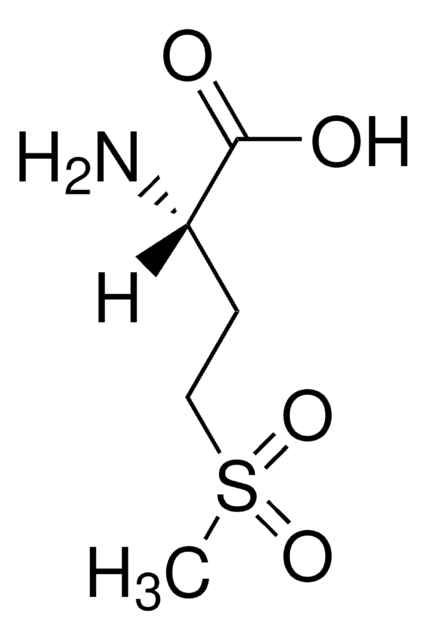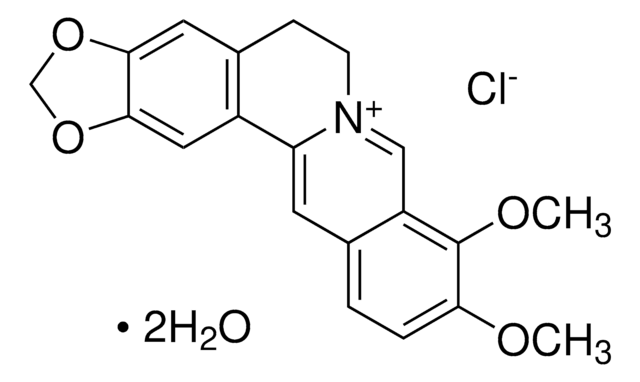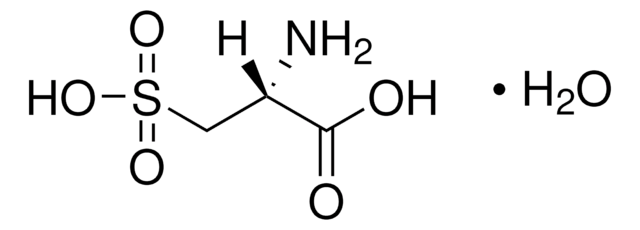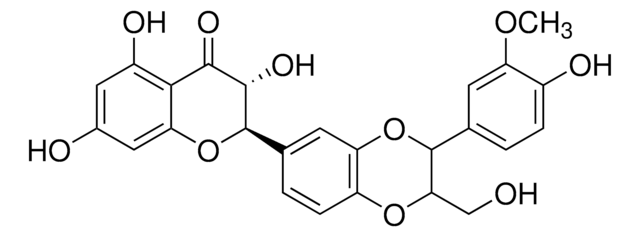PHL80429
Dihydroberberine
phyproof® Reference Substance
Sinonimo/i:
5,8-Dihydro-9,10-dimethoxy-6H-benzo[g]-1,3-benzodioxolo[5,6-a]quinolizine, Dihydroumbellatine
About This Item
Prodotti consigliati
Grado
primary reference standard
Nome Commerciale
phyproof® Reference Substance
Saggio
≥90.0% (HPLC)
Produttore/marchio commerciale
PhytoLab
Formato
neat
InChI
1S/C20H19NO4/c1-22-17-4-3-12-7-16-14-9-19-18(24-11-25-19)8-13(14)5-6-21(16)10-15(12)20(17)23-2/h3-4,7-9H,5-6,10-11H2,1-2H3
FZAGOOYMTPGPGF-UHFFFAOYSA-N
Categorie correlate
Descrizione generale
Applicazioni
- (+)-Abscisic acid in plant stress hormone research: Investigated the cloning of CAT genes in Satsuma mandarin and their expression characteristics in response to environmental stress and arbuscular mycorrhizal fungi. This research highlights the crucial role of (+)-abscisic acid in mediating plant responses to abiotic stresses, demonstrating its utility as a high-purity biochemical assay reagent for studying stress response signaling in plants (Liu et al., 2024).
- (+)-Abscisic acid in biochemical assays: The physiological and biochemical response of Styrax tonkinensis seedlings to waterlogging stress was analyzed. This research underscores the importance of (+)-abscisic acid in biochemical assays aimed at understanding how plants cope with water stress, reinforcing its role in signal transduction studies related to plant survival mechanisms under adverse conditions (Chen et al., 2024).
- Synthetic (+)-abscisic acid in plant biology: Examined RNA splicing and its effects on the postharvest physiological deterioration of cassava storage roots. The study discusses the involvement of (+)-abscisic acid in plant biology, particularly in how it influences postharvest changes through its role in signaling pathways that control physiological processes in plants (Gu et al., 2024).
Note legali
Avvertenze
Danger
Indicazioni di pericolo
Consigli di prudenza
Classi di pericolo
Acute Tox. 2 Oral
Codice della classe di stoccaggio
6.1A - Combustible, acute toxic Cat. 1 and 2 / very toxic hazardous materials
Classe di pericolosità dell'acqua (WGK)
WGK 3
Punto d’infiammabilità (°F)
Not applicable
Punto d’infiammabilità (°C)
Not applicable
Scegli una delle versioni più recenti:
Possiedi già questo prodotto?
I documenti relativi ai prodotti acquistati recentemente sono disponibili nell’Archivio dei documenti.
Il team dei nostri ricercatori vanta grande esperienza in tutte le aree della ricerca quali Life Science, scienza dei materiali, sintesi chimica, cromatografia, discipline analitiche, ecc..
Contatta l'Assistenza Tecnica.







